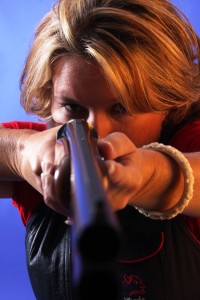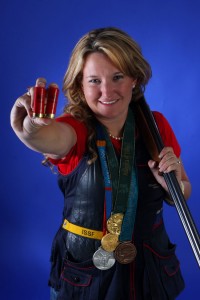August 07, 2012
By Eric R. Poole

Kim Rhode has become an American Olympic staple. Among her most significant accomplishments, she has won Olympic gold three times (1996, 2004 and 2012), silver (2008) and a bronze medal (2000). In 2012, she set out to do something no other Olympic athlete has ever done: medal in five consecutive Olympic games, and in doing so, is helping to bring the shooting sports to the forefront of worldwide attention.
Eric R. Poole was able to snag an exclusive interview with Rhode, who on Sunday shot an Olympic record 99/100 in women's skeet shooting to clinch her third gold medal.
 What did it feel like to hold your first Olympic medal?
What did it feel like to hold your first Olympic medal?
Advertisement
I ended up putting the medal in the sock drawer because I didn't know what to do with it. I had to take it everywhere.
What's it like to be an Olympic champion representing the United States?
When I won my first medal at the 1996 Olympics, I didn't realize what I had achieved. I knew what I had worked for, but I didn't understand how it would affect other people's lives. Once, when I gave a speech to 400 women at a college, afterward a woman diagnosed with cancer came up to me and said that she knew she could win. I almost cried. You don't realize what it means to others until you experience it. When you're a young kid, it was just a competition, a match. When you represent your country, I find that it impacts you differently.
Advertisement
How did you first get into shooting?
I don't remember the first time I ever shot a gun, but I was very little — and very, very small. I can remember sitting on a lawn chair and dad helping me to hold the gun and take down the recoil. And I remember my first limit of doves. I started competing at 10 years old. A lot of people don't realize that I started in the junior NRA programs shooting smallbore .22, but I eventually took up shooting a shotgun. I was maybe 12 or 13 when I first earned a spot by shooting bunker trap out at Prado. I won the match and earned the right to go to the Junior Olympic Training Program. Then I got a call that I was ineligible because of my age. I was very upset and decided that I was going to do this. I went to the American Championship for American Skeet, and Lloyd Woodhouse — the Olympic coach — was there. He saw me compete, and I won the World title. He said, "We'll make an exception if your mother comes with you." It was from there that I was introduced to the International styles.
Do you practice with the same load you shoot with?
Yes, I use the same Winchester International load. I used to shoot a special reload using all Winchester components and went into shooting the International load that they now produce. It has the most developed shells Winchester has ever made.
How often do you practice?
Up until recently, I've been shooting every single day, seven days a week. I would average anywhere between 500 and 1,000 rounds a day.
Do you have any unusual superstitions?
I don't know if it's really a superstition, but I'm not really big into changing something when everything seems to be working. I won't shoot in a collared shirt because I can't get the mount into the same spot. I do the same thing, over and over again. The routine helps to set myself up for each target. That's really what this game is about — being a machine while taking in the conditions around you.
Do you have any rituals ahead of a competition?
About the only thing I'll do on the morning of a competition is that I'll turn on the cold water for a shower to wake myself up. I've been doing this since I was a little kid. We do so much traveling and competing overseas that when there's a time change I'm usually competing when I'd otherwise be asleep.
Have you ever had an issue while transporting your guns internationally?
The Olympic committee handles transport of guns, so I don't usually see the problems that come from that. I have had my gun stolen prior to a match. That was 2008. There was a lot of media attention on it. It was the night before the selection process for the Olympic team. We never caught the people who actually stole it. A bunch of people were really kind and ended up replacing that gun. So that's the gun I actually shoot now.
What's the best piece of advice you've ever received?
Choose your friends wisely. I think that's a great one. You want people around you that will build you up and help you through thick and thin. Those who you consider your true friends. I can truly say that I have amazing friends and family. When I'm gone for three months, I can come home and pick up where I left off. When you're down, those people know what to say, and when you're up they know what you need to hear.
 Could that also apply to you professionally?
Could that also apply to you professionally?
There's definitely loyalty involved. Even when I finished second or third place, Winchester was still there for me. If your word and handshake are not worth anything, money won't make up for it. People will switch brand loyalty because for them it's all about the money. It doesn't mean that the company produces a great product, and that's why I don't put my name with everything.
What do you say to women who want to take up sport shooting?
No two Olympic sports are the same. Some are about muscles, and some are about speed. Some are about reaction time, and some are about hand and eye coordination. In shooting it's about adjusting to the situation. It becomes a game of intellect. It's one of the few sports that men and women can compete on the same field, on equal footing.
What do you think about before a competition?
There's always a winner and someone who doesn't win.
What's your favorite part about your career as a competitive shotgunner?
I have to say the people in competition. I love being in that moment where you're tied and it's coming down to the wire. I've never had a problem staying motivated or losing interest because this is what I love. It's what I do. I get to go hunting, travel around the world and represent the country. It has to be one of the greatest jobs ever.
Enjoy articles like this?
Subscribe to the magazine.
Get access to everything Guns & Ammo has to offer.
Subscribe to the Magazine
